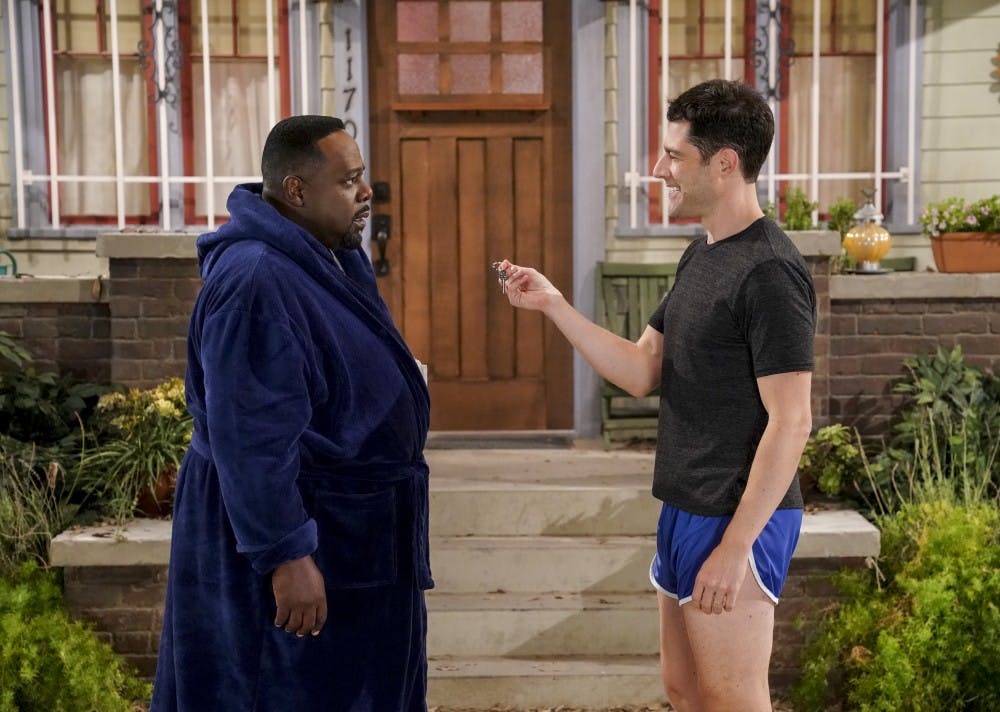The Neighborhood’s pilot opens with Max Greenfield (of recently–ended New Girl fame), Beth Behrs (from the also cancelled 2 Broke Girls), and the young Hank Greenspan as their son. They are sitting in a car, heavy–handedly laying out the show’s exposition: they are moving because of Behrs’s new job as a school principal. They’re a simple family with liberal–minded values. The son, Grover, mentions that his grandmother disapproves of them moving to a black neighborhood. To prove it, he begins counting the number of black people on the street.
This opening is so helplessly tone–deaf that I cannot fathom how it ended up on–screen. This scene of set–up is intercut with Cedric the Entertainer (who is also an executive producer) as Calvin Butler and his adult son Malcolm, played by Sheaun McKinney. Calvin insists that his son do undesirable yard work in preparation for their barbecue with sarcastic quips. The laugh track drones on at every beat. None of it feels deserved.
What is confusing about The Neighborhood is that, both in advertising and in editing style, it belongs in the 1990s. The familial comedy is reminiscent of Full House or Home Improvement, the content of Family Matters, and the laugh track of every single program from this era put together. It would be one thing if the show were parodying such a television–style, which is what I expected watching the first trailer for it. Instead, the sitcom–angle is played dreadfully straight and, as it turns out, this method firmly belongs in the past.
With clever, quick, biting shows like Arrested Development, It’s Always Sunny in Philadelphia, and Brooklyn Nine–Nine, the image of the sitcom is changing. No longer do these comic shows need to be live, have laugh tracks, or use quick–cuts and jazzy transitions between scenes. These three shows have functioned without them for many, many seasons, with It’s Always Sunny now beginning its thirteenth, making it the longest–running live–action sitcom. The success of these shows is palpable, and with it, the norm is changing. With this new format, trying to tackle social commentary in the old style of sitcoms feels contradictory, clashing form with content in a way that doesn’t work.

Monty Brinton/CBS ©2018 CBS Broadcasting, Inc.
Of course, the content itself is questionable. Max Greenfield as Dave Johnson with his shiny, one–hundred–watt smile, makes a joke about his neighbors’ last name: “We’re the Butlers,” says Tichina Arnold as Tina, Calvin’s wife, to which Dave replies, “Oh, great, ‘cause I rang for some tea about a half hour ago.” Calvin begins to open his mouth with indignance before Tina stops him, and then the comment is left forgotten. It is a point of comedy that Calvin tries to call out Johnson’s unwittingly racist comment, a beat in an extended joke that is Calvin being too critical of Dave.
The Neighborhood does make some genuine points though, like that there are “two types of racist: ones who hate black people and ones who love black people,” a too–true critique of racist white people who only feign sympathy for black people for brownie points. There is also an explicit note about gentrification which does not go forgotten: the Johnsons are a white family moving into a black area and we all know what that means.
The issue with these very earnest and correct criticisms of the dominant culture (particularly white culture) is that they are undermined by a joke afterward or are a joke in themselves. One could argue that this is a tactic to give audiences racial commentary while being sly about it and hiding it in jokes, but it doesn’t work. Some of the bits come off as flippant. Others are just unfunny. Calvin is a mouthpiece for the majority of these criticisms, but he is perceived by others as a too aggressive killjoy to Dave’s optimism. I am not suggesting that The Neighborhood shouldn’t try to tackle hard subjects, but in this format, they seem to be written off the second the laughter fades.
Either The Neighborhood shouldn’t be in the sitcom form or should be an obvious parody of the sitcom itself, which is apt to be mocked. The show keeps on undermining its political commentary with its jokes because the habit of sitcoms is to forget the point a moment after it happened: this cannot be done with bits about racism, gentrification, and the whole nine yards. It needs to stick with it. These things, it should argue, cannot be so easily forgotten.







